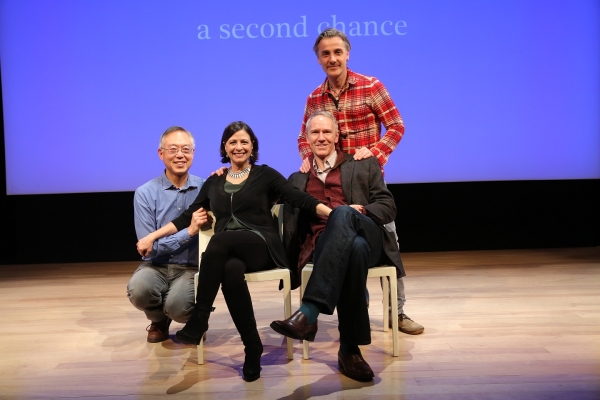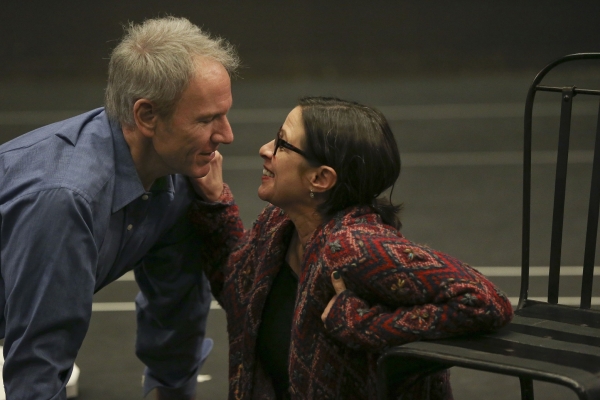Firsthand: Ted Shen, Author of A Second Chance at The Public Theater
Advice from Stephen Sondheim is what provided Shen with the groundwork for his new musical.

(© Joan Marcus)
"Why not?"
That was Stephen Sondheim's response to my demurral to his suggestion that I write a musical after I had attributed my songwriter's block to a "lack of inspiring topics."
Now I heard myself saying, "Well, because I've never written one before."
"Do you realize how ridiculous that sounds?" he said. "I even have the concept for you. Write about the first year of your relationship with Mary Jo."
"There's no shortage of 'topics' there!" he added slyly, in reference to his having witnessed the early stages of romance between Mary Jo, now my wife of almost eight years, and me. Mary Jo was a fairly recent divorcee and I a very recent widower at the time we met in 2003. Getting together had been exhilarating, but hardly simple.
That conversation took place in 2007. It took another year for me to get up the nerve to begin the project. By 2010 I had written enough music to present a concert of songs from the show at Joe's Pub, and in the fall of 2011 the show was given its premiere at Signature Theatre in Arlington, Virginia. Now, in what sometimes still seems like an incomprehensible honor and privilege, a new revised version of A Second Chance is about to open at The Public Theater in New York.
The show's journey to The Public wasn't quite as straightforward as just described. Not only had I never written a musical, but I had had no experience or training in writing for the theater. In fact, I had never even aspired to write a musical. During my high school and college years, I had been a jazz musician and had studied some music theory, but I hadn't attended my first Broadway musical until I moved to New York to begin a 30-year career in business.
In 1970 my life changed profoundly when I saw Stephen Sondheim's Company. That experience transformed all my notions about the possibilities of musical theater while also turning me into a "Sondheim fanatic." When I retired from my business career in 1999 to return to my musical roots by studying songwriting with Ricky Ian Gordon for two years, though, I still had no intention of writing a musical.
So, in the summer of 2008, after another year of songwriter's block, I thought, "Indeed, why not?" I began sketching an outline for a story of a widower and a divorcee that would be based on the first year of my relationship with Mary Jo and that would be conveyed through songs. Quite miraculously, two key figures entered the picture: Jonathan Butterell, a theater director whose work I particularly admired, and Oskar Eustis, legendary dramaturg as well as Artistic Director of The Public Theater. They each took an interest in the story and played invaluable roles in helping to shape it throughout its development. Jonnie focused on ensuring effective storytelling and theatricality, while Oskar provided profound insight and guidance in respect to the dramatic architecture of the piece.
One year and many drafts later, I enlisted good friends, Diane and Brian Sutherland – accomplished singer/actors – and Joseph Thalken – gifted pianist/music director/composer – to join Jonnie and me for an initial reading. It has been an enormous blessing to have retained this same team for all the workshops, readings, and performances that have since followed. Also extraordinary blessings were the decisions by Eric Schaeffer to produce the 2011 world premiere at Signature Theatre and, subsequently, by Oskar Eustis to produce the upcoming New York premiere at the Public.
My greatest blessing of all has been the loving support and inspiration I have received from Mary Jo. As I came to comprehend the magnitude of her generosity and trust in allowing me to expose details of our lives through the story, though, I found myself becoming increasingly protective and inclined to withhold or sanitize experiences I felt too personal to disclose truthfully. I decided to let go completely of attempting to tell our own actual story and instead to tell the fictional story of two invented and fully individuated characters – hence, the birth of "Jenna" and "Dan," whose distinct identities I have been trying ever since to make increasingly three-dimensional and idiosyncratic.
People like to ask me how much of the story is autobiographical. The literal answer to this is "none." Yet the underlying situations, conflicts and emotions are undeniably informed by personal experience and, I hope, may have some universal qualities as well.
In my role as composer, my preference has been to emphasize the use of "action songs" that show the characters interacting with each other and conversing primarily through lyrics rather than pure spoken dialog, and to limit the use of "introspection songs" that stop the action to express feelings and inner thoughts. I have attempted to create a contemporary musical "language" that is jazz-inflected rather than written in today's predominant pop-based genre.
At this moment, after more than five years of living with this evolving thing called A Second Chance, mostly working in isolation at my piano or computer keyboard, I am sitting in the back row of tech – in total awe – watching the most astonishingly talented and dedicated creative and production team, directed with exceptional sensitivity, clarity and vision by Jonathan Butterell, join in magical collaboration to bring music score and libretto to life at The Public Theater!

(© Tammy Shell)











